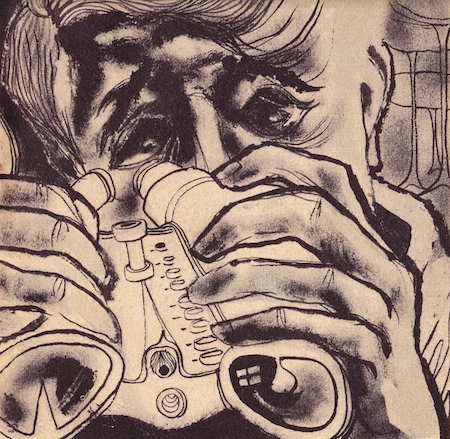Science Fiction
Dictionary
A B C D E F G H I J K L M N O P Q R S T U V W X Y Z
Wist Labs Makes Minority Report Family Videos Come True

In the 2002 Steven Spielberg movie Minority Report, a remarkable technology makes it possible for Tom Cruise's character to interact with his home movies:
(immersive home movies from Minority Report movie [2002])
Now, Wist Labs is trying to offer the same service.
You take a video
It's easy
Capturing a moment with Wist is just like taking a regular video.Wist makes it 3D
It's magic
Using sensors available in newer mobile devices, Wist captures 3D information about the world so it can make your memory immersive.Step inside your memory
It's immersive
You can step back inside your memory in the mobile viewer, in mobile AR, or in a VR headset.(Via Wist Labs.)
Science fiction author Clifford Simak warns against this kind of immersive technology in his 1957 short story Shadow World, describing the peeper, a device which allows a person to step inside his own internal world of memory and imagination:
You looked into it and you twisted the knobs until you had what you wanted and there was a picture. You stepped into the picture and you lived the life you found there - the sort of life you picked by the setting of the knobs. And there were many lives to pick from, for there were millions of combinations that could be set up on the knobs and the factors ranged from the lightest kind of frippery to the most abysmal horror.
(The peeper from Shadow World by Clifford Simak)The peeper was outlawed, naturally - it was worse than alcoholism, worse than dope, the most insidious vice that had ever hit mankind. It threw psychic hooks deep into the soul and tugged forevermore. When a man acquired the habit, and it was easy to acquire, there was no getting over it.
(Read more about Clifford Simak's peeper)
Thanks to Geoff Pilkington for tweeting about this company.
Scroll down for more stories in the same category. (Story submitted 2/7/2023)
Follow this kind of news @Technovelgy.| Email | RSS | Blog It | Stumble | del.icio.us | Digg | Reddit |
Would
you like to contribute a story tip?
It's easy:
Get the URL of the story, and the related sf author, and add
it here.
Comment/Join discussion ( 0 )
Related News Stories - (" Culture ")
A Remarkable Coincidence
'There is a philosophical problem of some difficulty here...' - Arthur C. Clarke, 1953.
Is It Time To Forbid Human Driving?
'Heavy penalties... were to be applied to any one found driving manually-controlled machines.' - Bernard Brown, 1934.
Indonesian Clans Battle
'The observation vehicle was of that peculiar variety used in conveying a large number of people across rough terrain.' - Jack Vance (1952)
Liuzhi Process Now In Use In China
'He was in a high-ceilinged windowless cell with walls of glittering white porcelain.' - George Orwell, 1984.
Technovelgy (that's tech-novel-gee!) is devoted to the creative science inventions and ideas of sf authors. Look for the Invention Category that interests you, the Glossary, the Invention Timeline, or see what's New.
Science Fiction
Timeline
1600-1899
1900-1939
1940's 1950's
1960's 1970's
1980's 1990's
2000's 2010's
Current News
The New Habitable Zones Include Asimov's Ribbon Worlds
'...there's a narrow belt where the climate is moderate.'
Can One Robot Do Many Tasks?
'... with the Master-operator all you have to do is push one! A remarkable achievement!'
Atlas Robot Makes Uncomfortable Movements
'Not like me. A T-1000, advanced prototype. A mimetic poly-alloy. Liquid metal.'
Boring Company Drills Asimov's Single Vehicle Tunnels
'It was riddled with holes that were the mouths of tunnels.'
Humanoid Robots Tickle The Ivories
'The massive feet working the pedals, arms and hands flashing and glinting...'
A Remarkable Coincidence
'There is a philosophical problem of some difficulty here...'
Cortex 1 - Today A Warehouse, Tomorrow A Calculator Planet
'There were cubic miles of it, and it glistened like a silvery Christmas tree...'
Perching Ambush Drones
'On the chest of drawers something was perched.'
Leader-Follower Autonomous Vehicle Technology
'Jason had been guiding the caravan of cars as usual...'
Golf Ball Test Robot Wears Them Out
"The robot solemnly hit a ball against the wall, picked it up and teed it, hit it again, over and again...'
Boring Company Vegas Loop Like Asimov Said
'There was a wall ahead... It was riddled with holes that were the mouths of tunnels.'
Rigid Metallic Clothing From Science Fiction To You
'...support the interior human structure against Jupiterís pull.'
Is The Seattle Ultrasonics C-200 A Heinlein Vibroblade?
'It ain't a vibroblade. It's steel. Messy.'
Roborock Saros Z70 Is A Robot Vacuum With An Arm
'Anything larger than a BB shot it picked up and placed in a tray...'
A Beautiful Visualization Of Compact Food
'The German chemists have discovered how to supply the needed elements in compact, undiluted form...'
Bone-Building Drug Evenity Approved
'Compounds devised by the biochemists for the rapid building of bone...'

